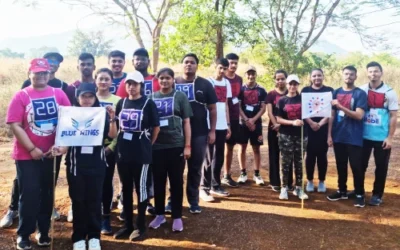How Outbound Team Building Training Benefits Corporate Employees?
In a world where over 70% of workplace failures are linked to poor collaboration and communication, companies can’t afford to focus solely on technical expertise. Today’s corporate landscape demands more – adaptability, problem-solving under pressure and seamless teamwork.

This is exactly where Outbound Team Building Training proves to be a game-changer. By taking employees out of their usual work setting and placing them in dynamic, adventure-driven environments, outbound programs go beyond theory to deliver experiential learning. These sessions blend outdoor challenges with carefully designed activities that improve leadership skills, boost trust and strengthen team synergy – all through hands-on, real-world problem-solving rather than traditional classroom lectures.
What is Outbound Team Building Training?
Outbound Team Building Training is a form of experiential learning that takes employees out of their routine workspaces and places them in an outdoor or offsite setting. It includes structured activities designed to improve communication, collaboration, decision-making, and leadership skills. This form of training is rooted in the philosophy of “learning by doing” – helping participants gain real-life lessons through active participation.
The activities may range from trekking, camping, and obstacle courses to problem-solving games, trust exercises, and role-playing scenarios. These are usually facilitated by experts who connect the activity’s learning with real-world workplace challenges.
Why Outbound Training is Important for Corporate Employees
Corporate employees often operate under deadlines, stress, and competitive pressure. While these conditions test productivity, they can also lead to burnout, miscommunication, and conflicts within teams. Outbound training provides employees with an opportunity to step away from daily tasks, recharge and develop crucial soft skills that directly impact workplace performance.
Some of the core benefits include:
- Improved Communication Skills – Open and clear communication develops as employees engage in group activities.
- Enhanced Problem-Solving Ability – Complex tasks in outbound programs mimic real workplace challenges, teaching employees to think strategically.
- Strengthened Team Bonding – Activities build trust and encourage employees to support one another.
- Leadership Development – Leaders emerge naturally during outdoor challenges, giving organizations insights into hidden talent.
- Stress Reduction – Being in nature and engaging in physical activities helps reduce workplace fatigue.
Outbound Training Process
For outbound training to be effective, it needs to be well-structured. A professional program typically follows a process that ensures the activities are engaging, relevant, and impactful.
- Needs Assessment
Before designing the program, trainers assess the organization’s requirements. This could involve:- Identifying skill gaps
- Understanding workplace challenges
- Setting learning objectives
- Program Design
Based on the needs assessment, trainers create a tailored program. This includes:- Selecting activities aligned with goals (e.g., communication games, leadership tasks)
- Choosing a suitable location (mountains, riverside camps, resorts)
- Planning the sequence of activities to maximize engagement
- Activity Briefing
Participants are briefed on safety protocols, rules, and objectives before starting. The facilitator explains how the activity relates to real-life work situations. - Experiential Activities
The core of outbound training lies in activities such as:- Trust Falls – Building mutual trust among teammates
- Raft Building – Encouraging creative problem-solving
- Obstacle Courses – Enhancing endurance, focus, and teamwork
- Treasure Hunts – Strengthening collaboration and time management
- Reflection & Debriefing
After the activity, participants share their experiences, challenges faced, and strategies used. Facilitators connect these lessons to workplace scenarios. - Feedback & Evaluation
Organizations and participants provide feedback to evaluate the program’s effectiveness, ensuring continuous improvement.

Outcomes of Outbound Training for Corporate Employees
Outbound training delivers both short-term and long-term benefits for corporate teams. Let’s break them down:
- Enhanced Teamwork and Collaboration
Working together in challenging outdoor scenarios forces employees to rely on each other’s strengths. This naturally builds trust and cooperation, making workplace interactions smoother. - Improved Communication
Clear communication is essential during activities to achieve a common goal. These skills transfer directly to office situations, reducing misunderstandings and boosting efficiency. - Better Problem-Solving Skills
Activities present unpredictable challenges, pushing employees to think outside the box. This develops a problem-solving mindset that benefits their daily roles. - Increased Leadership Potential
Certain situations demand quick decision-making and guidance. Employees who take charge during these moments display leadership qualities that may otherwise go unnoticed. - Boosted Morale and Motivation
Outdoor adventures offer a refreshing break from routine, re-energizing employees and improving their outlook toward work. - Conflict Resolution Skills
Facing challenges together allows employees to understand different perspectives, leading to healthier conflict management at work. - Stress Reduction and Wellbeing
Spending time outdoors and engaging in physical activities is scientifically proven to lower stress levels, enhance mood, and improve overall wellbeing.
Why Companies Should Invest in Outbound Training?
Outbound Team Building is not just a one-time fun event — it’s an investment in human capital. Organizations that prioritize employee engagement and development experience:
- Higher productivity
- Better employee retention
- Stronger workplace culture
- Enhanced innovation through collaborative thinking
When employees feel valued, connected, and supported, they contribute more effectively to organizational goals.
Outbound Team Building Training at Empower Activity Camps is more than just an outdoor adventure — it’s a strategic tool to develop the skills corporate employees need to thrive in a competitive business environment. By engaging in carefully designed experiential activities, employees build stronger relationships, improve problem-solving abilities, and enhance leadership potential.
For companies aiming to foster a positive, collaborative, and high-performing work culture, outbound training should be a part of their annual training and development strategy.

Transforming teams from ordinary to extraordinary, one adventure at a time!
Communication & Conflict Resolution Training: Building Stronger, High-Trust Teams
In every organization, communication is the backbone of performance—and conflict, when unmanaged, becomes one of the biggest barriers to productivity. Differences in opinions, work styles, and expectations are natural, but the way teams handle these differences...
5 Team Building Activities for Employees that Boost Productivity
Employee productivity doesn’t just depend on individual skills, it thrives when teams communicate effectively, trust one another, and collaborate with purpose. Traditional training programs inside boardrooms often fall short of creating meaningful behaviour change....
Summer Camp in Kolad near Mumbai & Pune: A Perfect Blend of Adventure, Learning and Growth for Kids
Summer vacations are more than just a break from school—they are an opportunity for children to explore, learn, and grow beyond classrooms. If you’re searching for a safe, enriching, and adventure-filled summer camp near Mumbai or Pune, Kolad stands out as an ideal...
Address:
Camp Office: 263, Sutarwadi,
Taluka Roha, Distt Raigad, Maharashtra – 402 304.
Camp Site: Village Kudli,
14 Km Off Kolad, Taluka Roha, Distt Raigad, Maharashtra – 402 308.
Office Hours: 8 am to 8 pm




